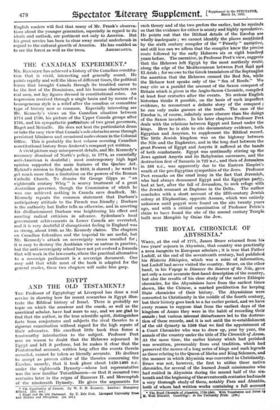THE CANADIAN EXPERIMENT.*
Ma. KENNEDY has achieved a history of the Canadian constitu- tion that is vivid, interesting and generally sound. He paints rapidly and well the ideas of different times, the political forces that brought Canada through its troubled career to be the first of the Dominions, and his human characters are real men, not lay figures dressed in constitutional robes. An impression received through a single brain and by means of a homogeneous style is a relief after the omnibus or committee type of history now so common. Especially interesting are Mr. Kennedy's views on the Canadian situation between 1774 and 1790, his picture of the Upper Canada groups after 1791, and his sympathetic portraiture of two great governors, Bagot and Metcalfe. He does not beat the particularist drum or take the easy view that Canada's sole obstacles arose through persistent blindness and occasional malevolence in the Colonial Office. This is probably the best volume covering Canadian constitutional history from Amherst's conquest yet written.
A vivid picture may misrepresent details, and Mr. Kennedy's summary dismissal of North's policy, in 1774, as essentially anti-American is doubtful ; most contemporary high legal opinion supported the main features of the Quebec Act. Ryland's mission to England, in 1810, is slurred ; he went to get much more than a limitation on the powers of the Roman Catholic Church. To dismiss Sir George Gipps as " an eighteenth century Whig " is scurvy treatment of a great Australian governor, though the Commission of which he was one achieved nothing in Canada save deadlock. Mr. Kennedy repeats the common statement that Durham's anticipatory attitude to the French was friendly ; Durham is the authority but Buller tells us otherwise, and in asserting his disillusionment Durham was heightening his effect and meeting radical criticism in advance. Sydenham's local government achievements in Lower Canada are overrated, and it is very doubtful if disruptionist feeling in England was as strong, about 1860, as Mr. Kennedy claims. The chapters on Canadian federalism and the imperial tie are useful, but Mr. Kennedy's attack on sovereignty seems uncalled for ; it is easy to destroy the Austinian view as untrue in practice, but the anti-sovereignty school have not yet evolved a formula that will work in the law courts,Where the practical alternative to a sovereign parliament is a sovereign document. One may add that while most of the book is adapted for the general reader, these two chapters will make him gasp.


































































 Previous page
Previous page